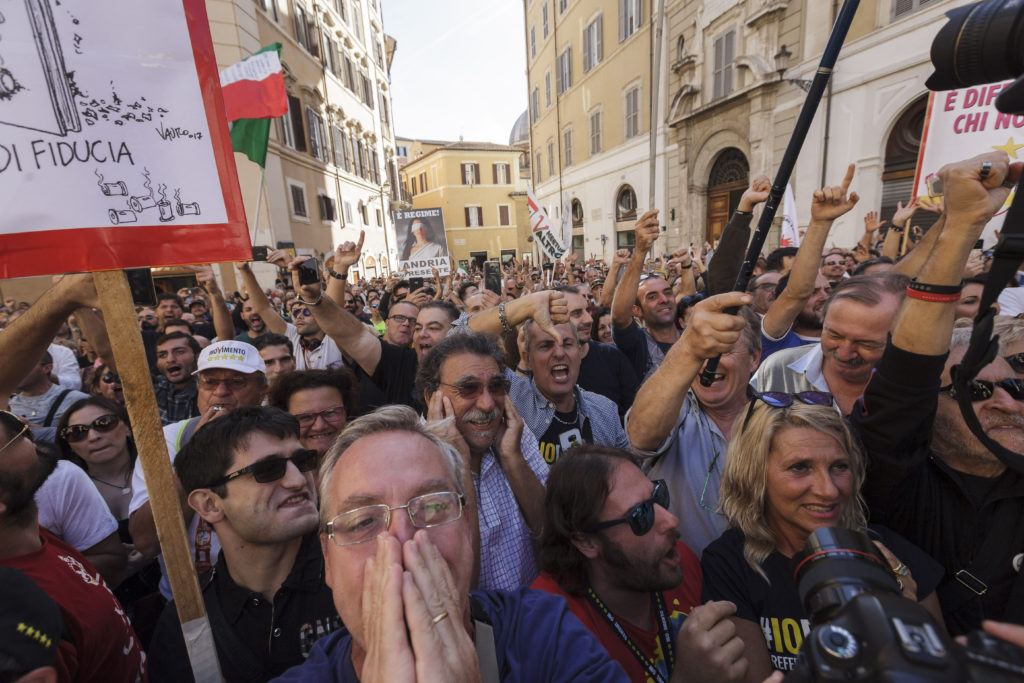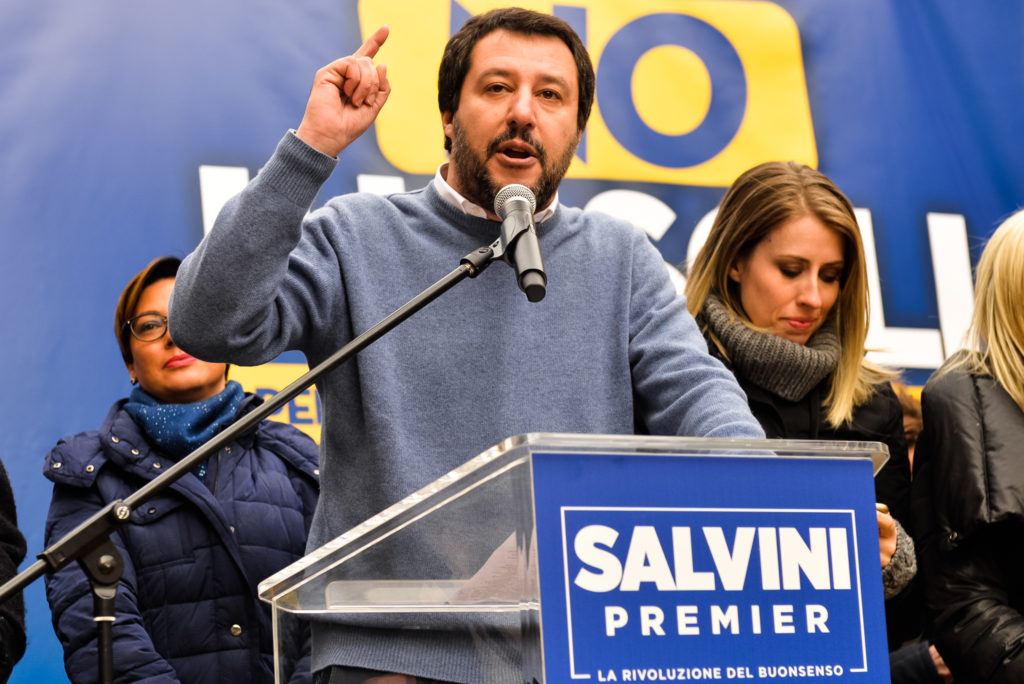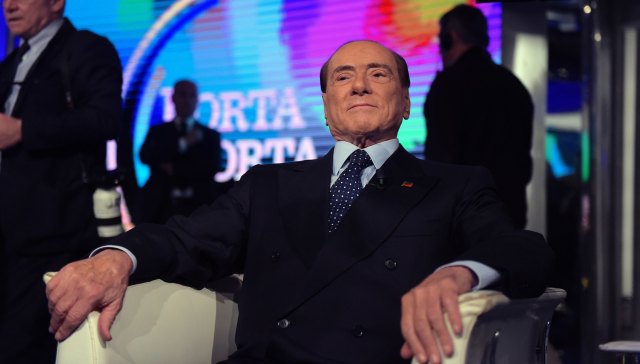Former Italian Prime Minister Silvio Berlusconi and de facto kingmaker in March. Photo by Eric Vandeville/ABACAPRESS.COM

One of January’s stranger spectacles was how warmly the 81-years-old, three-time-Italian-PM, Silvio Berlusconi, was received at the EU in Brussels, in the run up to Italy’s general election of 4th March:
- Jean-Claude Juncker and Antonio Tajani, the EU parliament president – a Forza Italia MEP and Berlusconi’s nominee to be the next conservative Italian prime minister – greeted him as an old friend.
- So did the leaders of the centre right European People’s Party (EPP) bloc. When asked whether Berlusconi was now “rehabilitated”, Manfred Weber, the influential German head of the EPP, said “Berlusconi is a great statesman and a great European”.
- Even Angela Merkel is hoping for a win from Berlusconi’s conservative phalanx – he supports her ongoing coalition-building attempts with the SPD – despite Berlusconi’s notorious description of the chancellor as “an unf—able lardarse” and his comparison of Martin Schulz – then European Parliament President -with a German prison camp guard in the TV comedy ‘Hogan’s Heroes’.[1. From Michael Day’s Being Berlusconi. The Rise and Fall from Cosa Nostra to Bunga Bunga (London 2015) and page 175 for Berlusconi’s comment on Merkel – also quoted in the EU Observer of 23 January].
Berlusconi is seen as a comparatively moderate force, despite Forza Italia being in an electoral pact with the Lega Nord (with whom he has governed before) and the much smaller post-fascist Fratelli d’Italia. Together they could scrape together the 35% of the vote needed for a workable majority.

Berlusconi has tempered the league’s euroscepticism through a division of labour, in which Forza concentrates on Italy’s economic woes while the Lega leader, Matteo Salvini beats the drum about migrants in Sicily. All that remains of its euroscepticism is a demand for Italy to abandon the Eurozone’s 3% budget deficit ceiling, though that worries the EU too. That leaves the Movimento Cinque Stelle (5SM or Five Star Movement), which is polling as Italy’s largest party on 29%, as the sole eurosceptic force – though its 31 year-old leader, Luigi Di Maio, has also cooled on the idea of a referendum on Eurozone membership
One of the odder facts about the election is that two of the most charismatic figures are disbarred from public office under the country’s Severino Law. 5SM’s comedic guru, the 69 year-old Beppe Grillo, is disqualified by a 1981 conviction for involuntary automotive manslaughter. Besides he has decided to abandon politics, in favour of a return to the stage.[2. Politico, last week, reported that the comedian has removed all mention of the party and its backers from his blog which once powered this anti-establishment enterprise].
Berlusconi has other problems. Italy’s justice system is fair to a fault. A protracted appeals process means that verdicts are rarely ruled ‘definitive’, while the statute of limitations ensures that many cases are timed out by procedural delays. Hardly anyone over 70, unless they are a psychotic axe murderer, goes to jail either. Berlusconi has survived 74 trials and 3,667 judicial hearings, racking up legal bills of €250 million, before his luck ran out on charges of tax fraud – in 2012. The former prime minister was convicted of using offshore companies to buy foreign TV rights at inflated prices – for which he did four hours a week community service in a hospice for people with dementia. As a former crooner on cruise ships, much of this involved singing to the elderly patients.
A year later, he was convicted of paying for sex with a minor, a 17 year old Moroccan ‘artiste’ Karima El-Mahroug aka ‘Ruby The Heartstealer’. This case came to court despite a call (from Paris) in 2010 to the police station in which Mahroug was initially detained. The prime minister claimed that Ruby was the granddaughter of then Egyptian president Hosni Mubarak. She was released to the guardianship of an entertainer friend of the prime minister, whose strip routine involved undressing from a nun’s habit. Berlusconi was eventually sentenced to seven years in jail – though that case is stuck in a labyrinthine appeals process.[3. Page 141 of Day’s Being Berlusconi.]
Before considering why people will still vote for Berlusconi, it is as well to recap what might weigh down the negative scales. Italy’s greatest contemporary film maker, Paolo Sorrentino, who made the marvelous Great Beauty and Divo, respectively about a weary Roman playboy and Giulio Andreotti, has had a go with his new film Loro.
He made his first fortune in property development in Milan, earning the moniker “King of Bricks”. Along the way he acquired a 145 room Villa San Martino in Arcore near Milan for a suspiciously low song. At a time when kidnapping of the rich was rife, anyone looking at Berlusconi as a victim was possibly deterred by his omnipresent “stable master”, a tall and lugubrious member of the Sicilian Cosa Nostra, an organisation with which Berlusconi also shared obscure banking facilities.
Berlusconi next spotted an entrée into the media sector, under the patronage of Socialist Party leader Bettino Craxi who, it has been widely said, the young tycoon cultivated with stuffed enevlopes.
While it was easy enough to acquire local town TV franchises, the national scene was blocked by the stolidly worthy Rai network, which like the UK’s BBC is subsidised through a license fee. While never knowingly underestimating the audience’s appetite for sleaze and slush, Berlusconi simply got his ramifying series of local stations to broadcast the same schedules a few seconds apart, and then established an advertising agency to fill the commercial slots. He also ensured that Rai contracted its news from his companies, and bought the newspaper Il Giornale too. By no coincidence, Craxi and the entire Socialist Party leadership occupied an entire floor of Rome’s plush Hotel Raphael for the next decade, until after the ‘Tangentopoli’ (Kickback City) scandal broke in 1992, Craxi was forced to flee to his luxury villa in Tunisia to evade a 27 year jail sentence. Happily for Berlusconi, the Christian Democrats imploded too, because of prime minister Giulio Andreotti’s mafia links. When the party disbanded in 1994, a huge gap was left at the heart of Italian politics.
The final part of Berlusconi’s empire, the football club AC Milan which he acquired in 1986, was a natural fit with his media business, as pre- and post- match TV analysis became as important as kicking the ball around for 90 minutes. The marketing tactics used for a football club were easily transposable to politics – all necessary to avoid Berlusconi’s biggest nightmare of a leftist government that might dismantle all the laws which had allowed his Fininvest empire to flourish.
His new party, based around a football slogan ‘Forza Italia’ (Go Italy!) was organised around 8,000 branches, by no coincidence the number of Catholic parishes in Italy, though even the Church would eventually decide the Cavaliere (he is very tight with the Milan cathedral hierarchy) was a touch risqué for them.
Berlusconi proved to be a cunning political campaigner, though his follow-through in office was often lamentable, since his overarching concern was to alter laws to benefit his empire and to keep himself, his $11-14 billion fortune, and his associates out of the hands of prosecuting magistrates. The latter included the British lawyer David Mills who handled Berlusconi’s offshore affairs, and was fined for accepting a $600,000 bribe from his client. Berlusconi’s appointments during three administrations were quirky. His private tax lawyer became Italy’s finance minister, while his equal opportunities minister was a former topless dancer, one of many provocations which eventually led to an acrimonious divorce from Veronica Lario, the tycoon’s long suffering second wife.
By the baroquely decadent final years of his time in office, Berlusconi’s Italy was being called a “mignottocrazia” or “tartocracy”, and not just because the prime minister had housed over a hundred handily available women in apartments in a Milan complex that the young Berlusconi had built. One further quirk of the corrupt and sclerotic justice system is the deliberate leaking of wiretaps – which the Italian system uses copiously against organised crime and terrorists – to the half of the media Berlusconi does not control. This is how the squalid details of ‘Bunga Bunga’ orgies at Villa San Martino, which the likes of Ruby the Heartstealer attended became public knowledge. Only one man present had sex, sometimes all night, and by this time the five foot five prime minister had had so much plastic surgery that he resembled a grinning priapic doll.[5. Bunga Bunga comes from a joke told to Berlusconi by his friend Colonel Gaddafi, in which two foreign hostages are required by an African tribe to choose between Bunga Bunga and death. The first chooses Bunga Bunga and is gang-raped by the tribe. The second chooses death but is raped first.]
It is not hard to see why Berlusconi was re-elected three times, and why in March he will be the de facto kingmaker, should the right squeak to victory. It certainly will in Calabria and Sicily where the Cosa Nostra, Camorra and N’drangehta syndicates can be relied on to get out their block vote, while the Lega cleans up Lombardy and Veneto.
Much of Berlusconi’s appeal is tied up with the myth of the uomo forte, the strong and successful businessman who gets things done. For years, judicial investigations could be dismissed as a commie conspiracy by ‘left-wing’ magistrates, even long after the Warsaw Pact states had imploded and Berlusconi’s oligarch-friendly pal Vladimir Putin was in the Kremlin. Indeed, Putin will be the real winner in this election, since apart from his friend, the only foreign leader to have ever slept in the Kremlin, both 5SM and Lega Nord are affiliated with his United Russia.

Elderly voters, who tend to watch a lot of TV, were and are fans of Berlusconi, who is promising to double pension payments, with costless dental and eye care, and free veterinary care for their beloved cani i gatti too. As in the past, Italy’s many small businessmen and self-employed may favour someone who has avoided paying taxes for so long. This time, Berlusconi and the Lega Nord are advocating flat taxes, of respectively 23% and 15%, and drastic simplification of tax procedures, which take an average of 238 hours to complete (the UK time is half that). This will tear a €27 billion hole in the public finances of Europe’s second most indebted country.[6. Report by Giovanni Legorano ‘The Flat Tax Us Back in Italy’s Election Campaign’ for the Wall Street Journal of 24 January 2018.]
Last but not least, many educated Italians were embarrassed by having a crass buffoon in a bandana as leader – he looked like a pirate when he hosted the Blairs at his Sardinian estate because his new hair had just been implanted. They call him Al Cafone, which elides the Chicago mobster with the Italian for a crass provincial boor. But many Italians like his buccaneering ‘giocatore’ (player) approach to life, and, there are men who would also like to be surrounded by admiring would-be starlets as we have just seen in Britain. Being rude to the overbearing Germans has never harmed Berlusconi either. Whether dismissing the 5SM ‘grillini’ as “layabouts who have never done a hard day’s work” will cut it remains to be seen, since younger voters may not like his policies that already add to those heavily slanted to elderly Italians.
The prospect of Berlusconi as the puppet master behind Tajani does not seem to appall the EU’s conservatives but there may be betrayal in the air. Both Five Star’s Luigi Di Maio and the Northern League’s Matteo Salvini are ambitious younger men and it is not inconceivable, if they have the numbers, that they might cut a deal at Berlusconi’s expense. At that point, the EU would be facing a real nightmare, rather than just the sinister comedy of a Berlusconi comeback, which to their disgrace, does not bother its conservatives at all.










Join the discussion
Join like minded readers that support our journalism by becoming a paid subscriber
To join the discussion in the comments, become a paid subscriber.
Join like minded readers that support our journalism, read unlimited articles and enjoy other subscriber-only benefits.
Subscribe